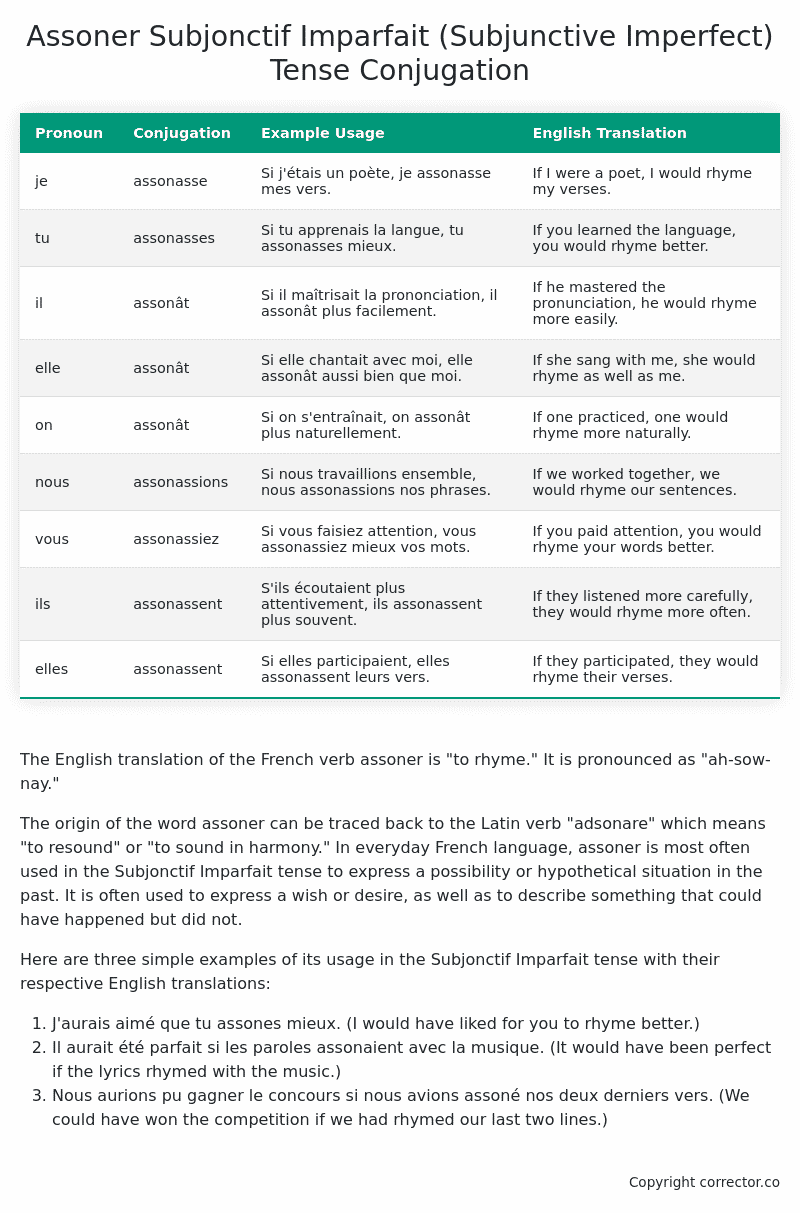Subjonctif Imparfait (Subjunctive Imperfect) Tense Conjugation of the French Verb assoner
Introduction to the verb assoner
The English translation of the French verb assoner is “to rhyme.” It is pronounced as “ah-sow-nay.”
The origin of the word assoner can be traced back to the Latin verb “adsonare” which means “to resound” or “to sound in harmony.” In everyday French language, assoner is most often used in the Subjonctif Imparfait tense to express a possibility or hypothetical situation in the past. It is often used to express a wish or desire, as well as to describe something that could have happened but did not.
Here are three simple examples of its usage in the Subjonctif Imparfait tense with their respective English translations:
- J’aurais aimé que tu assones mieux. (I would have liked for you to rhyme better.)
- Il aurait été parfait si les paroles assonaient avec la musique. (It would have been perfect if the lyrics rhymed with the music.)
- Nous aurions pu gagner le concours si nous avions assoné nos deux derniers vers. (We could have won the competition if we had rhymed our last two lines.)
Table of the Subjonctif Imparfait (Subjunctive Imperfect) Tense Conjugation of assoner
| Pronoun | Conjugation | Example Usage | English Translation |
|---|---|---|---|
| je | assonasse | Si j’étais un poète, je assonasse mes vers. | If I were a poet, I would rhyme my verses. |
| tu | assonasses | Si tu apprenais la langue, tu assonasses mieux. | If you learned the language, you would rhyme better. |
| il | assonât | Si il maîtrisait la prononciation, il assonât plus facilement. | If he mastered the pronunciation, he would rhyme more easily. |
| elle | assonât | Si elle chantait avec moi, elle assonât aussi bien que moi. | If she sang with me, she would rhyme as well as me. |
| on | assonât | Si on s’entraînait, on assonât plus naturellement. | If one practiced, one would rhyme more naturally. |
| nous | assonassions | Si nous travaillions ensemble, nous assonassions nos phrases. | If we worked together, we would rhyme our sentences. |
| vous | assonassiez | Si vous faisiez attention, vous assonassiez mieux vos mots. | If you paid attention, you would rhyme your words better. |
| ils | assonassent | S’ils écoutaient plus attentivement, ils assonassent plus souvent. | If they listened more carefully, they would rhyme more often. |
| elles | assonassent | Si elles participaient, elles assonassent leurs vers. | If they participated, they would rhyme their verses. |
Other Conjugations for Assoner.
Le Present (Present Tense) Conjugation of the French Verb assoner
Imparfait (Imperfect) Tense Conjugation of the French Verb assoner
Passé Simple (Simple Past) Tense Conjugation of the French Verb assoner
Passé Composé (Present Perfect) Tense Conjugation of the French Verb assoner
Futur Simple (Simple Future) Tense Conjugation of the French Verb assoner
Futur Proche (Near Future) Tense Conjugation of the French Verb assoner
Plus-que-parfait (Pluperfect) Tense Conjugation of the French Verb assoner
Passé Antérieur (Past Anterior) Tense Conjugation of the French Verb assoner
Futur Antérieur (Future Anterior) Tense Conjugation of the French Verb assoner
Subjonctif Présent (Subjunctive Present) Tense Conjugation of the French Verb assoner
Subjonctif Passé (Subjunctive Past) Tense Conjugation of the French Verb assoner
Subjonctif Imparfait (Subjunctive Imperfect) Tense Conjugation of the French Verb assoner (this article)
Subjonctif Plus-que-parfait (Subjunctive Pluperfect) Tense Conjugation of the French Verb assoner
Conditionnel Présent (Conditional Present) Tense Conjugation of the French Verb assoner
Conditionnel Passé (Conditional Past) Tense Conjugation of the French Verb assoner
L’impératif Présent (Imperative Present) Tense Conjugation of the French Verb assoner
L’infinitif Présent (Infinitive Present) Tense Conjugation of the French Verb assoner
Struggling with French verbs or the language in general? Why not use our free French Grammar Checker – no registration required!
Get a FREE Download Study Sheet of this Conjugation 🔥
Simply right click the image below, click “save image” and get your free reference for the assoner Subjonctif Imparfait tense conjugation!

Assoner – About the French Subjonctif Imparfait (Subjunctive Imperfect) Tense
Formation
Common Everyday Usage Patterns
Interactions with Other Tenses
Subjonctif Présent
Indicatif Passé Composé
Conditional
Conditional Perfect
Summary
I hope you enjoyed this article on the verb assoner. Still in a learning mood? Check out another TOTALLY random French verb conjugation!


